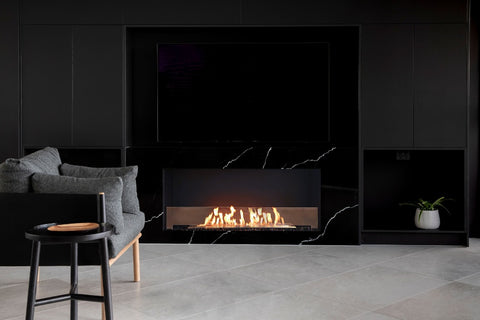
Understanding Bioethanol Fireplaces Functionality
In this article, we will explore the inner workings of bioethanol fireplaces and delve into the mechanism that enables them to provide eco-friendly heat with a clean burn. Bioethanol fireplaces have gained popularity as a sustainable heating option for the home, utilising bioethanol fuel and innovative burner technology.
Key Takeaways:
- Bioethanol fireplaces use bioethanol fuel to generate heat in a clean and eco-friendly manner.
- The mechanism behind bioethanol fireplaces involves the combustion of bioethanol, which produces a clean burn with minimal emissions.
- Bioethanol burner technology ensures efficient and controlled fuel consumption, resulting in a consistent and safe heating experience.
- Using bioethanol fuel for fireplaces reduces the carbon footprint and promotes sustainability, making it a greener alternative to traditional heating methods.
- Indoor bioethanol fireplaces offer the advantage of not requiring a chimney or flue, making them versatile and easy to install in various indoor spaces.

Bioethanol Fireplace Technology: How it Works
In this section, we will delve deeper into the technology behind bioethanol fireplaces. These innovative heating appliances utilise clean-burning ethanol to provide warmth without any harmful emissions. Let's explore how this eco-friendly heating option works and the safety features that are incorporated into bioethanol fireplaces.
How do clean-burning ethanol fireplaces work?
Clean-burning ethanol fireplaces operate on the principle of fuel combustion. They utilise bioethanol fuel, a renewable and sustainable energy source, to produce a real flame that radiates heat. The bioethanol burner technology allows for efficient and controlled burning, ensuring a clean and eco-friendly heating experience.
Unlike traditional fireplaces, bioethanol fireplaces do not require ventilation systems or chimneys, making them a versatile heating option for various indoor spaces. The fuel is stored in a designated reservoir, and a burner element is used to control the rate of ethanol combustion, regulating the heat output.
Bioethanol fireplace safety features
The safety of users is of paramount importance when it comes to bioethanol fireplaces. Manufacturers have incorporated several safety features to ensure their safe operation in indoor environments. Here are some key safety features found in bioethanol fireplaces:
- Flame regulation: Bioethanol fireplaces are equipped with adjustable flame settings, allowing users to control the intensity of the fire. This feature ensures that the flames remain manageable and prevent any potential hazards.
- Flame snuffer: To enhance safety, bioethanol fireplaces are designed with a flame snuffer mechanism. This feature allows users to extinguish the flame quickly when needed, providing peace of mind.
- Automatic shut-off: Many bioethanol fireplaces come with automatic shut-off capabilities. These mechanisms detect any abnormal conditions, such as a drop in fuel levels or overheating, and automatically turn off the fireplace to prevent any potential accidents.
By incorporating these safety features, bioethanol fireplaces provide a secure and worry-free heating solution for indoor environments.

Benefits of Bioethanol Fireplaces
In this section, we will explore the numerous benefits of using bioethanol fireplaces as sustainable heating options for your home. These innovative fireplaces offer a range of advantages that make them an attractive choice for eco-conscious homeowners.
1. Reduced Carbon Footprint
One of the key benefits of bioethanol fireplaces is their contribution to reducing your carbon footprint. These fireplaces utilise renewable bioethanol fuel, which is derived from plant materials. Unlike traditional wood-burning fireplaces, bioethanol fireplaces produce clean, smoke-free flames, minimising harmful emissions and air pollution.
2. Indoor Ethanol Fireplaces
Indoor ethanol fireplaces offer convenience and versatility. Unlike traditional fireplaces, they do not require a chimney or flue for installation. This means that you can easily incorporate an indoor ethanol fireplace into any room, even if there is no existing fireplace or adequate ventilation system in place. You can enjoy the warmth and ambience of a real flame without the hassle of extensive renovations.
3. Clean and Odorless Heating
Bioethanol fireplaces provide a clean and odorless heating experience. The bioethanol fuel burns without producing soot, smoke, or ash, making it easy to maintain and clean. Additionally, the lack of fumes and strong odors ensures a comfortable and enjoyable indoor environment for you and your family.
4. Design and Aesthetics
Bioethanol fireplaces come in a wide variety of designs, from sleek and modern to classic and rustic. This allows you to choose a fireplace that complements your home's interior design and adds a touch of elegance to your living space. The mesmerising flames of a bioethanol fireplace create a cosy and inviting atmosphere, perfect for gatherings with family and friends.
Overall, the benefits of bioethanol fireplaces make them an excellent choice for homeowners looking for sustainable heating options. The reduced carbon footprint, convenience of indoor installation, clean and odorless heating, and aesthetic appeal make bioethanol fireplaces a popular alternative to traditional heating methods.

Conclusion
In conclusion, bioethanol fireplaces provide a sustainable and eco-friendly heating solution for your home. These fireplaces function by utilising bioethanol fuel, which is a renewable energy source derived from organic matter. With clean-burning technology, bioethanol fireplaces produce heat without releasing any harmful emissions, making them an excellent choice for environmentally conscious individuals.
One of the key benefits of bioethanol fireplaces is their versatility. Unlike traditional fireplaces, bioethanol fireplaces do not require a chimney or flue, allowing for flexible installation in any indoor space. They are also portable and can be easily moved to different rooms, ensuring warmth wherever you need it.
Moreover, bioethanol fireplaces offer a captivating visual experience. The mesmerising flames create an inviting and cosy atmosphere, perfect for relaxing evenings or entertaining guests. With various designs and styles available, you can find a bioethanol fireplace that complements your home decor and enhances its aesthetic appeal.
In summary, bioethanol fireplaces combine functionality, sustainability, and aesthetics to offer a unique heating solution. By choosing a bioethanol fireplace, you not only reduce your carbon footprint but also enjoy the benefits of clean heat in your home. So, why settle for traditional heating options when you can embrace the advantages of bioethanol fireplaces and create a warm and eco-friendly environment for you and your loved ones?
Other content you'll love:
Safety of Indoor Bioethanol Fires Explained
Is a Flue Necessary for Bioethanol Fires?
Do Bioethanol Fires Produce CO2? Get Facts Here
Bioethanol Safety Guide: Is Bioethanol Flammable?
Bioethanol Fires Warmth – Get Cosy & Efficient Heat
Bioethanol Fires Safety Guide: Are They Dangerous?
Bioethanol Fires Running Costs Explained
Bioethanol Fires: Is Ventilation Required?
Bioethanol Fires: Do They Produce Heat?
Bioethanol Fires & Carbon Monoxide Risks Explained
Bioethanol Fires: Are They Electricity-Free?
Bioethanol Fireplace vs Gas: Eco-Friendly Choice?
Bioethanol Fireplace Explained: Eco-Friendly Warmth
Bioethanol Fire vs Log Burner: Best Choice for You


